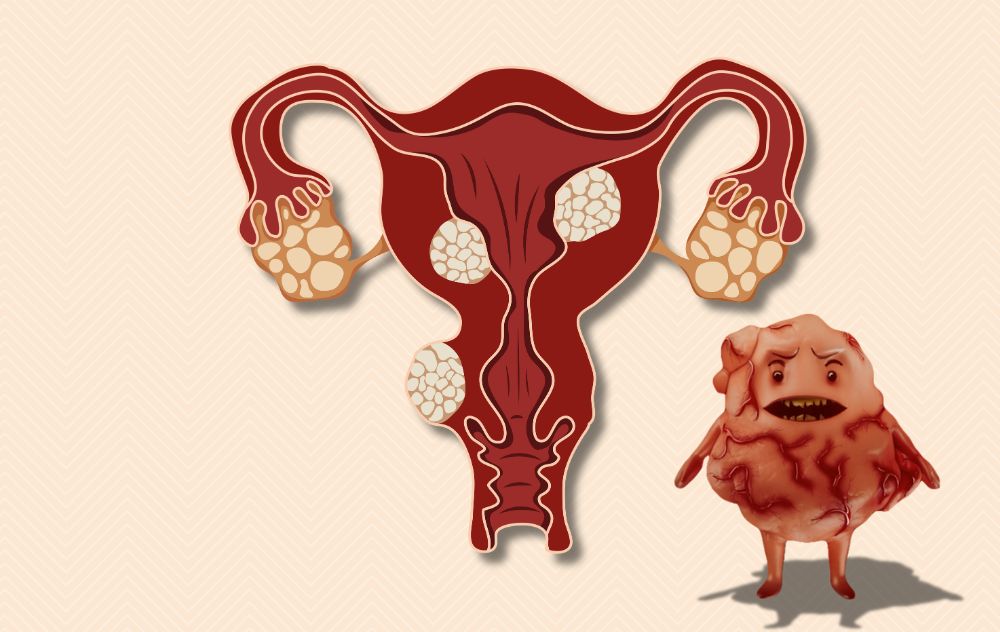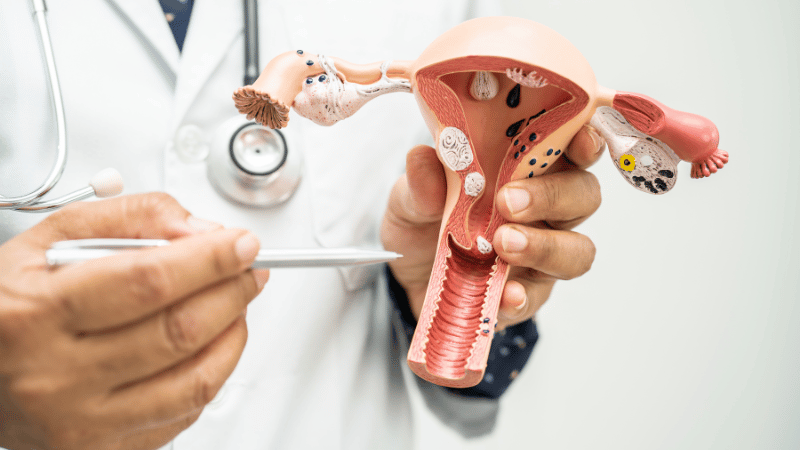
Being diagnosed with fibroids can leave many women feeling uncertain about what comes next, especially if symptoms like heavy bleeding, pain, or bloating are affecting daily life. A common question is whether fibroids can naturally resolve or if medical intervention is necessary.
In most cases, fibroids do not disappear without treatment. Left untreated, fibroids will likely persist or grow, which can lead to long-term complications.
This blog explores the natural behavior of uterine fibroids, including whether they can shrink on their own. We’ll also discuss the factors that influence their growth and the various ways they can impact a woman’s health, including fertility and pregnancy. Understanding these nuances is key to determining the most effective path for monitoring and care.
Do Uterine Fibroids Go Away or Shrink Naturally?
Uterine fibroids rarely shrink on their own. While some women may experience a reduction in fibroid size due to hormonal changes, such as after pregnancy or during menopause, this isn’t a guaranteed outcome.
Do Fibroids Go Away Without Treatment?
According to studies, only about 10% of fibroids are likely to resolve without treatment. The majority of fibroids will remain the same size or grow larger, increasing the risk of severe symptoms. Ongoing monitoring is the first step in tracking changes in symptoms, particularly when they begin to affect daily activities or quality of life. These symptoms can include pelvic pressure, frequent urination, constipation, back pain, or discomfort during intercourse.
Are you worried you may be suffering from fibroids? Don’t wait to find out. Take our free online symptom quiz to see if you should schedule an appointment with a specialist.
Why Fibroids Rarely Disappear Without Help
Uterine fibroids are made up of muscle and fibrous tissue, meaning they remain in the uterus since muscle and tissue don’t dissolve easily.
Another issue with waiting for fibroids to shrink on their own is that even small fibroids can still cause symptoms and impact fertility, depending on their location.
Medical treatment remains the most effective way to reduce or eliminate fibroids. Uterine fibroid embolization (UFE) is often recommended as a leading treatment option for individuals seeking fibroid relief without major surgery or compromising fertility.
The UFE procedure entails injecting tiny safe particles into the uterine arteries, cutting off the blood supply to the fibroids, allowing them to shrink and die, alleviating painful symptoms.
UFE offers several advantages compared to surgical fibroid removal, including:
- A minimally invasive technique
- Takes only 30-45 minutes
- Performed in an outpatient setting
- Performed through a very small entry point in the wrist or groin, meaning there are no stitches or scarring
- General anesthesia is not required
- Less risk
- Recovery of one to two weeks
- Leaves the uterus intact
UFE is highly effective, with our patients at USA Fibroid Centers experiencing a success rate of over 90 percent.
Do Fibroids Go Away After Pregnancy or Menopause?
Hormonal changes can influence the development and shrinkage of fibroids. Fibroids contain higher levels of estrogen and progesterone receptors than the surrounding uterine muscle, which makes them especially sensitive to these hormones.
Do Fibroid Tumors Go Away After Menopause?
As women reach menopause, their bodies naturally produce less estrogen. This drop in hormone levels often causes fibroids to shrink. Some fibroids may become asymptomatic or calcified, but they typically do not disappear entirely. While symptoms may lessen, the tumors themselves often remain in the uterus.
Do Fibroids Go Away After Pregnancy?
After childbirth, hormone levels gradually return to their pre-pregnancy state. Sometimes, this shift results in a reduction in fibroid size or fewer symptoms. However, pregnancy can also stimulate fibroid growth due to the temporary increase in hormone levels. Fibroid regression after pregnancy is not guaranteed, and many women continue to experience symptoms or find that their fibroids continue to grow even after birth.
Do Lifestyle Changes Help Fibroids Go Away?
Lifestyle changes alone won’t make fibroids go away. Eating a nutritious diet and exercising regularly can help minimize factors that contribute to fibroid growth, such as body weight, inflammation, and hormonal imbalance.
Can Fibroids Shrink With Exercise?
Exercise can help minimize fibroid-related symptoms, such as pelvic pressure and heavy periods, but it will not shrink fibroids. Regular physical activity may help regulate hormone levels, reduce inflammation, and improve overall circulation.
Can Fibroids Go Away With Weight Loss?
Weight loss may slow fibroid growth, but it does not necessarily cause fibroids to go away or shrink. Excess body fat can increase estrogen levels, potentially contributing to the growth of fibroids. Losing weight, especially abdominal fat, can lead to a reduction in estrogen levels, which may help prevent the progression of fibroids.
What Happens If You Leave Fibroids Untreated?
While fibroids are not always symptomatic, they have the potential to grow and cause complications if left untreated. Even if symptoms are mild at first, they can intensify over time, leading to heavier bleeding, worsening pain, or other health concerns that may require medical attention. The potential complications of untreated fibroids include:
- Heavier and prolonged menstrual bleeding
- Anemia due to blood loss
- Chronic pelvic pain or pressure
- Bladder and bowel issues
- Fertility challenges
- Continued fibroid growth
Regular check-ups are the most effective way to monitor fibroid growth and catch any potential complications early, allowing for timely treatment before symptoms become severe.
Don’t Wait for Fibroids to Go Away
Getting a precise diagnosis is the best way to understand your options and take control of your health journey.
The specialists at USA Fibroid Centers utilize advanced diagnostic tools to provide an accurate diagnosis and offer personalized treatment plans tailored to your specific needs. Our nationwide clinics offer uterine fibroid embolization (UFE), a minimally invasive treatment that effectively reduces the size of fibroids, while preserving the uterus and providing a faster recovery.
A personalized evaluation can help determine the best course of action for managing fibroid symptoms and preventing the condition from progressing.
Contact us today to schedule a consultation and take control of your health.
FAQs About Fibroid Disappearance and Treatment
Can the Type of Fibroid Affect Whether it Shrinks or Goes Away Naturally?
The type and location of a fibroid can influence whether it shrinks on its own. For example, subserosal fibroids on the outside of the uterus may shrink after menopause, while intramural or submucosal fibroids inside the uterine wall or cavity are more likely to persist. Factors such as fibroid size, hormonal fluctuations, and life stage can also play a role; however, most fibroids do not completely resolve without treatment.
Do Calcified Fibroids Eventually Go Away?
Calcified fibroids typically don’t go away on their own, even if they have hardened and stopped growing. Despite the lack of growth, calcified fibroids can still cause pelvic pain, pressure, or urinary problems if they’re large or poorly positioned.
Do Small Fibroids Go Away Faster Than Large Ones?
Small fibroids may have a higher chance of shrinking or disappearing on their own without treatment than larger fibroids, especially after menopause when estrogen levels drop. However, fibroids naturally shrinking on their own isn’t common, occurring in only about 10% of cases.
Can Fibroids Go Away Without Surgery?
Uterine fibroids can go away without surgery through non-surgical options like uterine fibroid embolization (UFE). UFE is a minimally invasive, non-surgical procedure that shrinks fibroids by cutting off their blood supply. Unlike surgery, UFE preserves the uterus, has a shorter recovery time, and provides lasting relief from fibroid symptoms.





